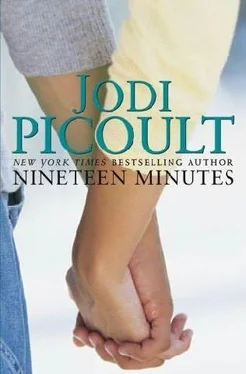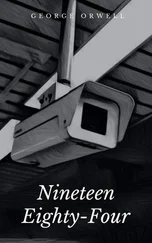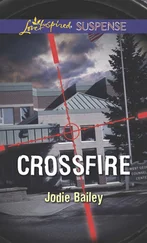If you were drifting with a thousand other people, could you really still say you were lost?
“Josie?” her mother said, prompting.
“It’s fine,” she lied.
Her mother left, and Josie started to gather her books. She realized, suddenly, that she’d never taken her science test. Catalysts. She didn’t remember anything about them anymore. Mrs. Duplessiers wouldn’t be evil enough to hand out the test on their first day back, would she? It wasn’t like time had stopped during these three weeks-it had changed completely.
The last morning she had gone to school, she hadn’t been thinking of anything in particular. That test, maybe. Matt. How much homework she’d have that night. Normal things, in other words. A normal day. There had been nothing to set it apart from any other morning at school; so how could Josie be sure that today wouldn’t dissolve at the seams, too?
When Josie reached the kitchen, her mother was wearing a suit-work clothes. It took her by surprise. “You’re going back today?” she asked.
Her mother turned, holding a spatula. “Oh,” she answered, faltering. “I just figured that since you were…You can always reach me through the clerk, if there’s a problem. I swear to God, Josie, I’ll be there in less than ten minutes….”
Josie sank into a chair and closed her eyes. Somehow, it didn’t matter that Josie herself was leaving the house for the day-she’d still imagined her mother sitting home waiting for her, just in case. But that was stupid, wasn’t it? It had never been like that, so why should now be any different?
Because, a voice whispered in Josie’s head. Everything else is.
“I’ve rearranged my schedule so I’ll be able to pick you up from school. And if there’s any problem-”
“Yeah. Call the clerk. Whatever.”
Her mother sat down across from her. “Honey, what did you expect?”
Josie glanced up. “Nothing. I stopped that a long time ago.” She stood up. “You’re burning your pancakes,” she said, and she walked back upstairs to her bedroom.
She buried her face in her pillow. She didn’t know what the hell was wrong with her. It was as if, after, there were two Josies-the little girl who kept hoping it might be a nightmare, might never have happened, and the realist who still hurt so badly she lashed out at anyone who got too close. The thing was, Josie didn’t know which persona was going to take over at any given moment. Here was her mother, for God’s sake, who couldn’t boil water but was now attempting pancakes for Josie before she went back to school. When she was younger, she had imagined living in the kind of house where on the first day of school your mother had a whole spread of eggs and bacon and juice to start the day off right-instead of a lineup of cereal boxes and a paper napkin. Well, she’d gotten what she wished for, hadn’t she? A mother who sat at her bedside when she was crying, a mother who had temporarily abandoned the job that defined her to hover over Josie instead. And what did Josie do? She pushed her away. She said, in all the spaces between her words, You never cared about anything that happened in my life when nobody was watching, so don’t think you can just start now.
Suddenly, Josie heard the roar of an engine pulling into the driveway. Matt, she thought, before she could stop herself; and by then, every nerve in her body was stretched to the point of pain. Somehow, she hadn’t really thought about how she would physically be transported to school-Matt had always picked her up en route. Her mother, of course, would have driven her. But Josie wondered why she hadn’t worked through these logistics earlier. Because she was afraid to? Didn’t want to?
From her bedroom window she watched Drew Girard get out of his battered Volvo. By the time she reached the front door to open it, her mother had come out of the kitchen, too. She held the smoke detector in her hand, popped off its plastic snap on the ceiling.
Drew stood in a shaft of sunlight, shading his eyes with his free hand. His other arm was still in a sling. “I should have called.”
“That’s okay,” Josie said. She felt dizzy. She realized that, in the background, the birds had come back from wherever they went in the winter.
Drew looked from Josie to her mother. “I thought maybe, you know, you might need a ride.”
Suddenly Matt was standing there with them; Josie could feel his fingers on her back.
“Thanks,” her mother said, “but I’m going to take Josie in today.”
The monster in Josie uncoiled. “I’d rather go with Drew,” she said, grabbing her backpack off the newel post of the banister. “I’ll see you at pickup.” Without turning around to see her mother’s face, Josie ran to the car, which gleamed like a sanctuary.
Inside, she waited for Drew to turn over the ignition and pull out of the driveway. “Are your parents like that?” Josie asked, closing her eyes as they sped down the street. “Like you can’t breathe?”
Drew glanced at her. “Yeah.”
“Have you talked to anyone?”
“Like the police?”
Josie shook her head. “Like us.”
He downshifted. “I went over to the hospital to see John a couple of times,” Drew said. “He couldn’t remember my name. He can’t remember the words for things like forks or hairbrushes or stairs. I kind of sat there and told him stupid things-who’d won the last few Bruins games, things like that-but the whole time I was wondering if he even knows he can’t walk anymore.” At a stoplight, Drew turned to her. “Why not me?”
“What?”
“How come we got to be the lucky ones?”
Josie didn’t know what to say to that. She looked out the window, pretending to be fascinated by a dog that was pulling its owner, instead of the other way around.
Drew pulled into the parking lot of the Mount Lebanon School. Beside the building was a playground-this had been an elementary school, after all, and even once it became administrative, neighborhood kids would still come to use the monkey bars and the swings. In front of the school’s main doors stood the principal and a line of parents, calling out the names of students and encouraging them as they walked inside.
“I have something for you,” Drew said, and he reached behind his seat and held out a baseball cap-one Josie recognized. Whatever embroidery had once been on it had long since unraveled; the brim was frayed and curled tight as a fiddlehead. He handed it to Josie, who ran a finger gently along the inside seam.
“He left it in my car,” Drew explained. “I was going to give it to his parents…after. But then I kind of thought you might want it instead.”
Josie nodded, as tears rose along the watermark of her throat.
Drew bent his head against the wheel. It took Josie a moment to realize that he was crying, too.
She reached out and put her hand on his shoulder. “Thank you,” Josie managed, and she settled Matt’s baseball cap onto her head. She opened the passenger door and reached for her knapsack, but instead of heading toward the school she walked through the rusted gates onto the playground. She strode into the middle of the sandbox and stared at her shoe prints, wondered how much wind or weather it would take to make them disappear.
Twice Alex had excused herself from the courtroom to call Josie’s cell, even though she knew Josie kept it turned off during classroom hours. The message she left both times was the same:
It’s me. I just wanted to know how you were holding up.
Alex told her clerk, Eleanor, that if Josie called back, she was to be disturbed. No matter what.
She was relieved to be back at work, but had to force herself to pay attention to the case in front of her. There was a defendant on the stand who claimed to have no experience with the criminal justice system. “I don’t understand the court process,” the woman said, turning to Alex. “Can I go now?”
Читать дальше












